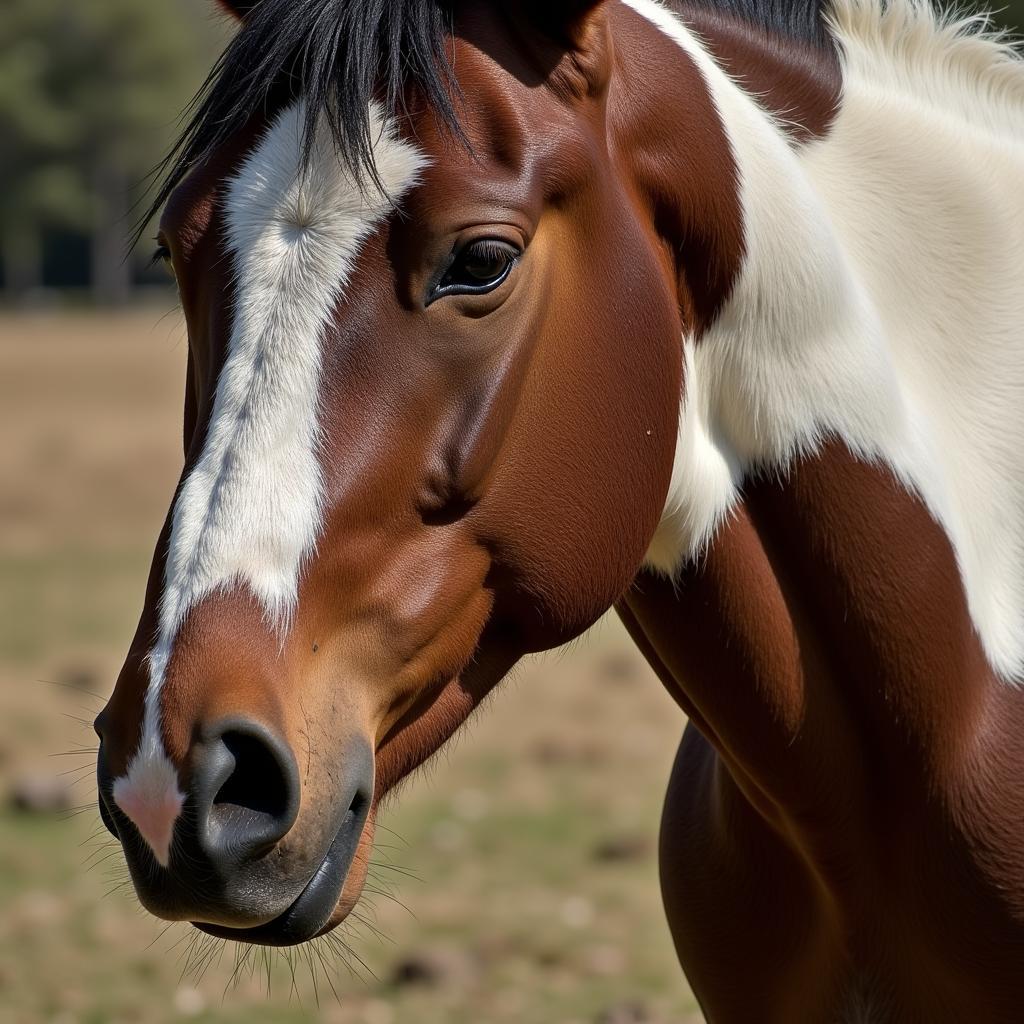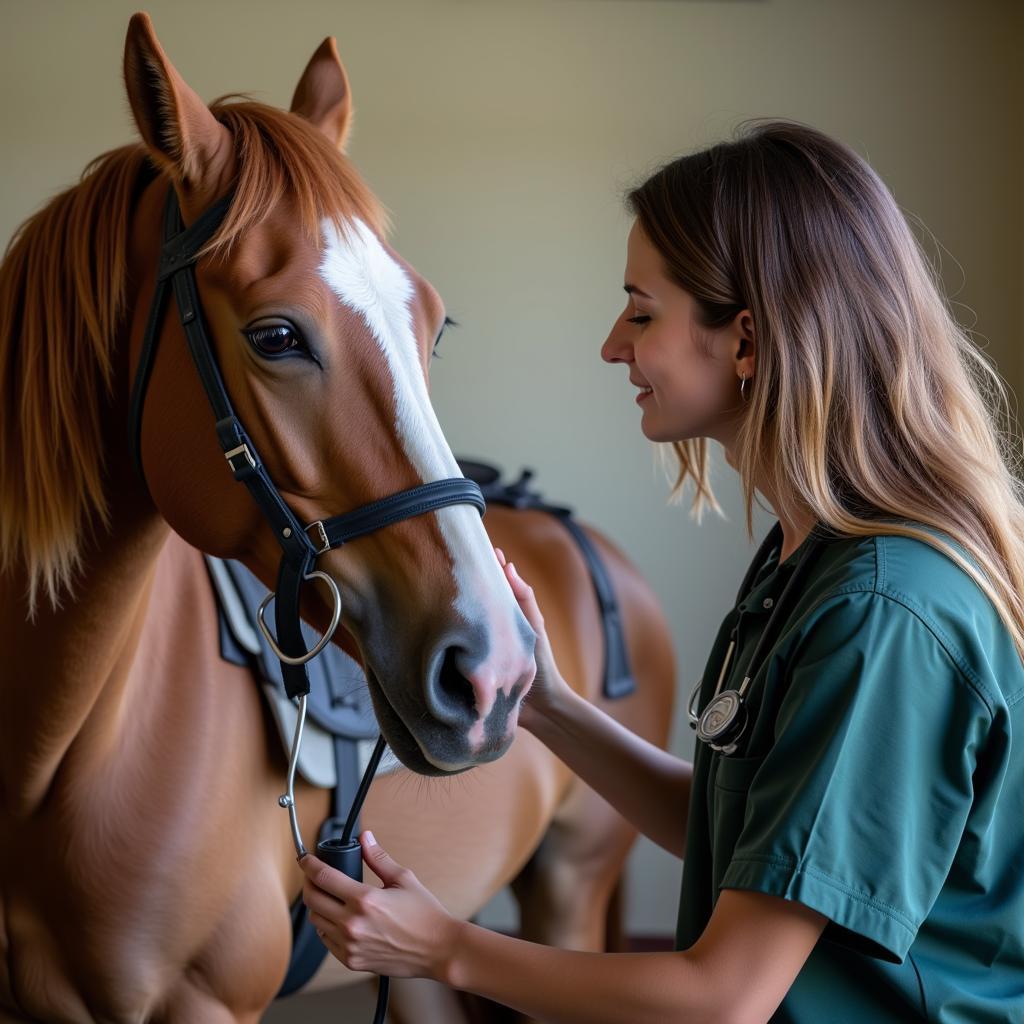Anhidrosis in horses, also known as “dry coat syndrome” or “non-sweating disease,” is a serious condition that impairs the horse’s ability to sweat. This can be particularly dangerous in hot and humid climates, as the horse loses its primary means of regulating body temperature. Anhidrosis Horse Supplement is one of the methods owners are turning to in order to help their horses cope. But is it right for your horse?
 Horse Showing Anhidrosis Symptoms
Horse Showing Anhidrosis Symptoms
Understanding Anhidrosis in Horses
Anhidrosis is characterized by a reduced or complete inability to sweat. While the exact cause of anhidrosis is still unknown, some potential contributing factors include:
- High temperatures and humidity: Horses rely heavily on sweating to stay cool in hot and humid weather. Prolonged exposure to these conditions can stress the horse’s thermoregulatory system.
- Genetics: Some breeds, like Thoroughbreds and Warmbloods, may have a genetic predisposition to anhidrosis.
- Electrolyte Imbalances: Electrolytes, like sodium, potassium, and chloride, play a crucial role in the sweating process. Imbalances can disrupt this delicate system.
- Stress: Prolonged stress from training, competition, transportation, or environmental factors can contribute to anhidrosis.
Recognizing the Signs of Anhidrosis in Your Horse
Early detection and intervention are crucial in managing anhidrosis. Be vigilant and watch for these signs in your horse, especially during hot weather:
- Decreased or absent sweating: This is the most obvious sign. Horses with anhidrosis may have little to no sweat, even after strenuous exercise.
- Elevated body temperature: Anhidrosis makes it difficult for horses to regulate their body temperature. A rectal temperature above 101.5 degrees Fahrenheit is a red flag.
- Rapid breathing and heart rate: The horse’s respiratory and cardiovascular systems work overtime to compensate for the lack of sweating.
- Lethargy and reduced performance: Overheating can make your horse sluggish and reluctant to work.
- Dry, flaky skin: The horse’s coat may appear dull, rough, and have patches of dry, flaky skin.
 Anhidrotic Horse Exhibiting Rapid Breathing
Anhidrotic Horse Exhibiting Rapid Breathing
How Can An Anhidrosis Horse Supplement Help?
While there is no cure for anhidrosis, several management strategies can help your horse cope. Anhidrosis horse supplements are formulated to support the horse’s thermoregulatory system and address potential underlying deficiencies. Key ingredients in these supplements may include:
- Electrolytes: Replenishing electrolytes lost through minimal sweating helps re-establish the fluid balance necessary for thermoregulation.
- Vitamins and Minerals: Certain vitamins (like B vitamins and Vitamin E) and minerals (like zinc and selenium) play vital roles in maintaining healthy metabolic function and cellular health, both of which are important for temperature regulation.
- Amino Acids: Amino acids are the building blocks of protein and are essential for various bodily functions, including muscle recovery and repair, important for horses exercising in the heat.
Choosing the Right Supplement for Your Horse
When selecting an anhidrosis horse supplement, it’s essential to consult with your veterinarian. They can help you determine:
- The severity of your horse’s condition: Different supplements may be recommended depending on whether your horse has partial or complete anhidrosis.
- Underlying health conditions: Your veterinarian can assess if your horse has any other health issues that need to be considered when choosing a supplement.
- Potential drug interactions: Some supplements may interact with medications your horse is already taking.
“It’s important to remember that supplements are not a quick fix,” says Dr. Sarah Jones, a veterinarian specializing in equine health and performance. “They work best as part of a comprehensive management plan that includes environmental modifications and supportive care.”
 Veterinarian Taking a Horse's Temperature
Veterinarian Taking a Horse's Temperature
Tips for Managing Anhidrosis in Horses
In addition to anhidrosis horse supplements, incorporate these management strategies to help your horse stay cool and comfortable:
- Provide ample shade and ventilation: Ensure your horse has access to a well-ventilated stall with fans or a shaded paddock.
- Adjust exercise routines: Avoid strenuous activity during the hottest part of the day. Opt for early morning or evening rides when the temperature is cooler.
- Offer cool water frequently: Always have fresh, cool water readily available. You can encourage drinking by adding electrolytes to the water.
- Use cooling methods: Hosing your horse down with cool water, especially along the large muscle groups, can help lower body temperature. Using fans in combination with hosing can further enhance evaporative cooling.
- Monitor your horse closely: Keep a close eye on your horse’s vital signs during hot weather. Contact your veterinarian immediately if you notice any signs of heat stress.
Conclusion: Proactive Care is Key
Anhidrosis can be a challenging condition to manage, but with the right approach, you can help your horse live a comfortable and active life. Anhidrosis horse supplements, used in conjunction with a comprehensive management plan, can play a crucial role in supporting your horse’s well-being. If you suspect your horse might have anhidrosis, don’t hesitate to contact your veterinarian. Early diagnosis and intervention are crucial for effective management and ensuring your equine partner’s long-term health and happiness.
FAQs About Anhidrosis Horse Supplements
1. How long does it take for an anhidrosis horse supplement to work?
The time it takes for an anhidrosis horse supplement to show results can vary depending on the severity of the condition and the horse’s individual response. It’s essential to be patient and consistent with supplementation.
2. Can anhidrosis horse supplements be used long-term?
Many anhidrosis horse supplements are formulated for long-term use. However, it’s always best to consult with your veterinarian to determine the appropriate dosage and duration of supplementation for your horse.
3. Are there any side effects of anhidrosis horse supplements?
Anhidrosis horse supplements are generally safe when used as directed. However, some horses may experience mild digestive upset, such as loose droppings, especially when first starting the supplement.
4. Can anhidrosis be prevented?
While it may not be possible to completely prevent anhidrosis, taking proactive steps to manage your horse’s environment and workload during hot weather can help reduce the risk.
5. What are some other signs of heat stress in horses?
In addition to the symptoms mentioned above, other signs of heat stress in horses include:
- Profuse sweating that suddenly stops
- Muscle tremors
- Stumbling or incoordination
- Depression or lethargy
- Collapse
If you notice any of these signs, it’s essential to seek veterinary attention immediately.
Do you have other questions about caring for your horse?
Justus Horses USA is your go-to resource for all things equine. Explore our website for more informative articles and tips on horse care, training, and more.
Need personalized advice? Contact our expert team at Phone Number: 0772127271, Email: [email protected] Or visit us at: QGM2+WX2, Vị Trung, Vị Thuỷ, Hậu Giang, Việt Nam. We have a 24/7 customer care team ready to assist you.